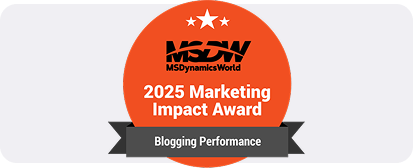What is ERP Consultant? | Top Consultants in Canada
Do you know that 184,594 companies are using ERP globally? Among them, 47,656 companies are utilizing Microsoft Dynamics solutions. Companies use ERP solutions to improve efficiency, integrate disparate business processes, eliminate data silos, and get real-time data.
However, purchasing an ERP system is not enough because you need to align the ERP system as per your business requirements. That’s where you require an ERP consultant who will personalize the system and implement the specific module as per your requirements.
For example, Microsoft Solutions Partner consists of various ERP consultants who help companies implement the MSFT ERP. In this blog, we will explore the critical role of ERP consultants, their skillsets, and benefits of hiring them.
Table of Content
What is the Role of ERP?
Before talking about consultants, let's understand the ERP system and what it does. An ERP software system is a type of software that is used by organizations to help manage day-to-day business activities such as accounting, procurement, project management, risk management and compliance, and supply chain operations.
An ERP suite will also include enterprise performance management, which is software that is used to plan, budget, forecast, and report on an organization's financial results. ERP's overall purpose is to integrate all the business processes and functions into one system.
To put it another way, instead of having a separate system for finance, HR, sales, and operations, ERP systems offer a centralized interface and database, enabling data to flow through the organization. ERP eliminates data silos and creates better communication and visibility for business.
Core Components of ERP Architecture
A robust ERP system typically includes modules for:
- Finance/Accounting: Automating the accounts payable/accounts receivable, budgetary controls, compliance reporting, and so on.
- Supply Chain: Automating the procurement, inventory management, logistics, etc.
- Human Capital Management: Integrating the payroll, recruitment, and performance management.
- Customer Relationship Management (CRM): Synchronizing sales pipelines with service and delivery.
These disciplines typically rely on common data sources and share a common database. As a result, their interaction delivers consistency between functions while freeing each discipline from manual data input and processing multiple times.
Strategic Advantages of ERP Implementation
It is particularly relevant to organizations that adopt ERP in their businesses and can show quantified improvements. Organizations that have adopted ERP can typically demonstrate improvements in the following:
- Operational efficiencies: 95% of businesses will have reduced process cycle time in their workflow automation.
- Reduced costs: Organizations typically reduce IT maintenance costs by 30-40% by implementing common systems.
- Compliance: Automated audit trails and regulatory reporting and reduced risk of non-compliance.
- Scalability: Modular architecture that can be plugged into a new market or product.
What Does an ERP Consultant Do?
An ERP consultant is a highly skilled professional who helps businesses select, implement, customize, and optimize ERP systems. They act as a bridge between the business needs and the technical capabilities of the ERP software. Their role is multifaceted and typically involves
Needs Assessment and System Selection
Consultants conduct granular analyses of existing workflows, identifying pain points like manual data reconciliation or supply chain bottlenecks. Using this assessment, they match organizational requirements with vendor offerings, whether opting for extensible platforms like Microsoft Dynamics 365 or industry-specific solutions.
Implementation and Customization
Post-selection, consultants oversee system configuration, ensuring alignment with business rules. This includes:
- Developing custom interfaces for legacy system integration
- Programming automated triggers for inventory reordering or invoice approvals.
- Migrating historical data while maintaining integrity across modules.
Change Management and Training
Successful ERP adoption hinges on user acceptance. Consultants design phased training programs, addressing resistance through:
- Role-based workshops for finance, HR, and operations teams.
- Simulated scenarios to demonstrate real-time analytics benefits.
Post-Implementation Support
Post-go-live consultants monitor system performance troubleshoot issues like integration errors or report discrepancies. Many offers ongoing optimization services, updating workflows to accommodate mergers or regulatory changes.
Skill Matrix for ERP Consultants
Effective consultants blend technical prowess with business acumen.
Effective consultants blend technical prowess with business acumen:
| Technical Skills | Business Competencies |
|---|---|
| ERP platform certification (e.g., SAP, Oracle) | Process mapping and reengineering |
| SQL/Python for data migration | Change management strategies |
| API integration techniques | Industry-specific regulations |
| Cloud infrastructure management | ROI analysis and budgeting |
Certifications such as SAP ERP Business Process Integration validate expertise, while experience in sectors like manufacturing or healthcare ensures contextual relevance.
Also Read: Business Central vs SAP
ERP Specialist vs. ERP Consultant: What's the Difference?
While the terms are sometimes used interchangeably, there's often a subtle distinction between an ERP specialist and an ERP consultant.
ERP Specialist: Technical Engineer
Specialists focus on system maintenance, including:
Database Optimization: Tuning SQL queries for faster reporting.
Security Protocols: Implementing role-based access controls and encryption.
Patch Management: Applying vendor updates without disrupting operations.
ERP Consultant: The Strategic Partner
Consultants operate at a higher altitude, engaging in
- Business Process Reengineering: Redesigning workflows to leverage ERP capabilities.
- Vendor Negotiations: Structuring licensing agreements for cost efficiency.
- Digital Road mapping: Aligning ERP enhancements with long-term business goals.
Reasons to Hire an ERP Consultant
Hiring an ERP consultant or ERP consulting firm involves significant benefits:
Experience and Expertise: Consultants have unique understanding and experience by working with so many businesses and seeing ERP implementation from start to finish.
Objective Point of View: They take an objective stance on your business processes and can find improvements where you may not have seen any or didn't realize it could be changed.
Reduced Risk: There is risk in ERP implementation, and experienced consultants should mitigate this risk in what is a complex project and can cost so much and business can be disrupted if not done correctly.
Can Implement Faster: ERP consultants have best practices from their own complex ERP implementation, and the assets of their consulting firm, that will enable them to shorten the implementation timeframe.
Knowledge of Your ERP System: Properly using all facets of your ERP system will require a knowledge of the system, and integrating the best from the ERP system, so that you will maximize your return on investment.
Focus on Business, Not Project Management: By allowing your company to hire an ERP consultant, your internal employees can continue to focus on business, instead of project management of the SAP implementation.
Regardless of whether you are searching for ERP consulting services in general or want to find an ERP consultant in Canada, ERP consulting services in Vancouver, or ERP consulting in Toronto, finding a qualified consultant with the right expertise is imperative to the success of your ERP implementation!
Leading ERP Consulting Partners in Canada
As more Canadian businesses embrace digital transformation, Microsoft Dynamics 365 has become a go-to ERP solution for streamlining operations, improving visibility, and driving smarter decisions. But choosing the right consulting partner can make all the difference in the outcome of your implementation.
Below are some of Canada’s most trusted Microsoft ERP consultants—each with a distinct approach, industry strengths, and service model.
Dynamics Square
Certified Microsoft Solutions Partner | Offices in Toronto, Vancouver, Montreal
Dynamics Square is a certified Microsoft Solutions Partner and a trusted name in ERP consulting. With a strong presence in Canada (Toronto, Vancouver, Montreal), they specialize in Dynamics 365 implementation, support, training, and optimization.

Why Choose Dynamics Square?
Industry Experience: Proven track record across retail, manufacturing, healthcare, and finance.
Certified Experts: Microsoft-certified consultants with in-depth Dynamics knowledge.
End-to-End Service: From discovery and implementation to support and upgrades.
Tailored Solutions: Customized ERP configurations to fit your business model.
Local Support: In-market consultants who understand regional regulations and business culture.
Whether you’re planning a new ERP implementation or want to optimize an existing system, Dynamics Square provides strategic insight and technical expertise to ensure a smooth, successful ERP journey.
Itergy
Based in Montreal | Microsoft-Focused Infrastructure & Identity Services

Itergy provides a robust offering in IT infrastructure, cloud identity, and Azure solutions. Their ERP work typically fits well with broad IT Transformations, including cases where businesses are also pursuing modernization of their ERP and infrastructure together.
Ideal for: Organizations looking for cloud infrastructure & identity management and IT governance to align with their ERP needs.
Quisitive
North America-Wide Presence | Full-Service Digital Transformation Partner

Quisitive has a wide variety of Microsoft solutions they support, including Dynamics 365, Power Platform, Azure, and cloud modernization. Their enterprise consulting model usually gets attention from larger organizations who want a multi-layered transformation strategy that integrates not just with ERP but also analytics, AI, cloud solutions.
Ideal for: Enterprises seeking a bundled service provider with Dynamics 365 as part of a broader digital strategy.
ProServeIT
Headquartered in Mississauga | Strategic IT Services Provider

ProServeIT provides technological roadmaps, cloud migrations, and Microsoft 365 support along with their ERP services. Their differentiation is strong in strategic IT alignment using analyses to help clients plan and implement their digital adoption journeys—having Dynamics 365 is simply one part of that adoption roadmap.
Ideal for: Organizations needing IT leadership support alongside Microsoft ERP solutions.
Catapult ERP
Vancouver-Based | SMB-Focused Dynamics 365 Partner

Catapult concentrates on small & medium-sized businesses, supporting Business Central implementations and offering managed services. Catapult has had success being a customer-focused Firm offering leaning engagement with ERP rollouts to clients who are seeking straightforward and transparent engagements with the complexities out in the back.
Ideal for: Small to medium-sized businesses striving for straightforward ERP implementations with support from a customer-focused Firm.
Choosing the Right ERP Consultant or Company
It is essential that you are evaluated correctly, and you choose the right partner for your ERP journey. When evaluating ERP consulting companies, look for the following:
Experience: You want to ensure the firm has experience in your industry, as well as experience with the specific ERP system you are looking to implement (for example, implementation experience of Dynamics 365).
Expertise: You will want to ensure that the firm's consultants have the right mix of technical knowledge and knowledge of the end-to-end business process.
Methodology: Understand their implementation methodology and get an idea of how they will manage the project.
References: Obtain client references for the firm and discuss their experiences with businesses they have worked with.
Cultural Fit: You will want to choose a consultant or firm whose working style matches yours as well as the organization’s values.
Local Knowledge: If you are in a specific geographic region like Canada (Ontario, Vancouver,Toronto), you may be interested in learning about a firm with some local presence and knowledge of regional business practices.
Conclusion: ERP Consultants as Catalysts for Organizational Excellence
ERP consultants do more than traditional IT roles; they become architects of digital maturity. By bringing technology investments in line with strategic direction and visions, they enable organizations to tap into ERP systems, which become engines of innovation rather than tools of operations and maintenance. As agile, data-driven operations become a heightened priority for organizations, the role of consultants evolves from implementer to vision creator, ensuring that ERP investments equate to a competitive advantage over the longer term.
Even if this team has specialists, there is a distinction between specialists and consultants through the lens of equilibrium. Equally, both need specialists to maintain the integrity and effectiveness of the systems, while consultants re-envision business activity with the technology.



